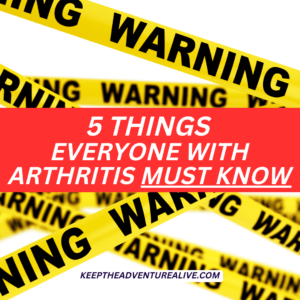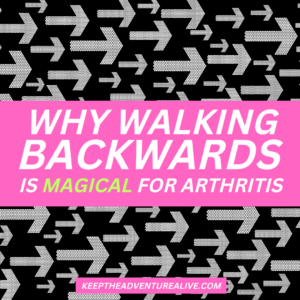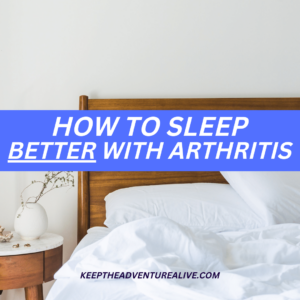A cortisone shot in the knee can be very tempting but you must first have all of the knowledge before making a decision. Cortisone shots have been questioned recently because of their lack of effectiveness and potential adverse effects to cartilage. On the other hand, as an arthritis specialist, I have known people that have had success with them. The major key to success is confidently having a plan. What should that plan include and what do you need to know about a cortisone shot in the knee? Let’s take a look.
The Keep the Adventure Alive blog is reader supported and we may receive small commissions when you purchase through our links.
These are things I have actually heard from patients with osteoarthritis after getting a cortisone shot.
“I feel like I am counting down the days until my next cortisone shot because it only lasts a little while.”
” I didn’t feel any difference in pain after getting the cortisone shot.”
“I felt like a new person after getting a cortisone shot, wondering why I didn’t get one sooner!”
As you can see, there are many different experiences when it comes to cortisone shots. They work for some but may not work for others.
There are, though, a few ways you to prolong pain relief and improve the effect of them. Here are 7 things you should know before making a decision about a cortisone shot in the knee:
What you should know before getting a cortisone shot in the knee
1. They aren't for everyone..
In my experience there are certain people who seem to do much better with cortisone shots than others.
If you are having difficulty finding any sort of pain relief and have given a solid effort to conservative management, you may benefit from one. This includes trying changes in diet (find the best anti-inflammatory foods here), quality exercise, improving sleep, and controlling stress- just to name a few.
Without giving a solid attempt at these things, a cortisone shot may not work for you. Here’s why:
Cortisone shots are meant to help relieve inflammation and improve joint lubrication. If you are constantly feeding your body inflammatory foods or aren’t exercising to improve blood flow to the joint, you likely won’t feel pain relief no matter what you do to the joint.
If you are having difficulty walking around your house and getting things done because of pain, a cortisone shot in the knee may give you the inch of relief that you need!
If pain is not very limiting and just rather annoying, you may not experience significant relief from a cortisone shot as your first line of action.
2. Cortisone shots aren't a permanent solution
One very common question is how long do cortisone shots last?
The answer, typically 2-3 months if you’re lucky.
According to WebMD, “Most experts say you should limit injections to no more than once every three or four months. Get no more than about four shots in any one joint.”
These limitations are set because cortisone shots are not a long term solution for pain relief. They are simply a supplement to help with pain relief.
It is important to note these injections do pose further risk if the recommended dose is exceeded. According to an article from CreakyJoints,
"Too-frequent injections in the same area can weaken the bones, ligaments, and tendons, which is why doctors limit how often you get steroid shots in a given joint"
CreakyJoints
If you have already recieved a cortisone shot in the knee or are thinking of getting one, the most success lies in having a plan for what to do afterwards.
One of the BEST plans is to use this new found pain relief to show your joints how to move again. This can be single-handedly the best way to make this pain relief actually last.
Unsure where to start with movement? Try this routine.
3. Cortisone shots do have risks
Just like anything you inject into your body, there are risks involved that do deserve to be considered.
There are risks for infections, increased pain following injection, weakening of the cartilage, and stiffness.
CreakyJoints also points out, “Other possible side effects of steroid shots include facial flushing, skin discoloration, local bleeding, or an allergic reaction. Cortisone shots can also raise your blood sugar in the short term, so they’re not recommended for people with diabetes whose blood sugar is poorly controlled.”
4. There is a chance for adverse reactions
Recent research has begun to uncover some not-so-promising evidence surrounding cortisone shots for knee osteoarthritis. In an article posted in Arthritis South Wales, they examined to a study posted in 2019 that found intra-articular corticosteroid injections led to…
- Accelerated OA progression
- Subchondral insufficiency fractures (SIF) (factures in the cartilage covering the bone)
- A risk of osteonecrosis (bone death from lack of blood flow)
- Rapid joint destruction, including bone loss (meniscal damage, joint space narrowing)
Although it may not be particularly common, these findings can actually be pretty alarming!
This is one of the considerations when deciding on if a cortisone shot is right for you as there could be a risk for serious consequences.
5. There is a possibility for arthritis pain relief
Now, I have known many people who have received these shots without adverse signs or any problems. Those that have actually been able to find powerful pain relief.
The question remains though, what are you going to do with this pain relief. We have to take advantage of it or else pain will return.
If you had arthritis pain relief from a cortisone shot in the knee you have to have a plan. You have to treat your knee in the best way possible.
You can do this a few different ways:
- Get yourself a pair of supportive shoes. This will help absorb some of the stress going up to the knee joint to further save your cartilage. KURU Footwear is my favorite brand for arthritis friendly tennis shoes, casual shoes and even sandals!
- Find ways to move that will strengthen your joints without flaring up pain! Get started on my youtube channel.
- Learn more about what osteoarthritis actually is and how you can prevent pain once the cortisone shot in the knee wears off. Check out the video below!
6. There are other options for arthritis pain relief
There are other options when it comes to knee osteoarthritis relief besides cortisone shots. A few of my favorite pain relieving tactics you can try before getting a cortisone shot in the knee include:
- Knee compression brace. These can help to relieve arthritis pain as pain and compression are felt with the same receptors in our bodies. These are very inexpensive and are totally worth a try. Make sure you get the right size. Here’s my favorite brace here.
- Heating pads. Heating pads can be magical when it comes to arthritis pain relief. They help to induce relaxation of the muscles. Here is my favorite heating wrap here.
- Light exercise can really help when getting out of bed or after a long day of activity. This video is one of the best when trying to decrease knee joint pain and stiffness.
7. What a cortisone shot feels like
This is important especially if you are thinking of getting one. Is it going to hurt? What should I expect?
The general consensus is cortisone shots typically aren’t painful. There have been a few people that stated they did hurt going in though. Most of these patients that reported pain had joint swelling.
It is injected via a needle into your joint space so it has been described as feeling pressure in your joint as well as feeling “weird” afterwards.
When you get one, you should take it easy for a few days depending on the surgeon’s recommendations. Keep that in mind if you have something like a trip or an activity planned after getting the shot.
Conclusion
There is a lot to consider before agreeing to a cortisone shot in the knee. It is important to have all of the information so you can make an informed decision. They unfortunately don’t guarantee pain relief and do come with risks.
They can be helpful in certain circumstances. The more you know, the better questions you can have and the more confidence you will feel in your decision.
Alyssa Kuhn
Disclaimer: This post is for general informational purposes only. It should not be used to self-diagnose and it is not a substitute for a medical exam, cure, treatment, diagnosis, and prescription or recommendation. It does not create a doctor-patient relationship between Dr. Kuhn and you. You should not make any change in your health regimen or diet before first consulting a physician and obtaining a medical exam, diagnosis, and recommendation. Move Well Age Well, LLC and Dr. Alyssa Kuhn, PT, DPT are not liable or responsible for any advice, course of treatment, diagnosis or any conclusions drawn, services or product you obtain through this video or site




